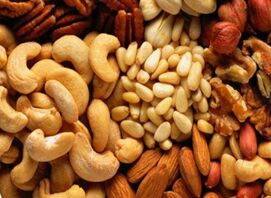每周吃两次坚果或降低心脏病的死亡率
|
Eating nuts twice a week linked with lower risk of death from heart disease 每周吃两次坚果或降低心脏病的死亡率 New research has found that eating nuts at least twice a week appears to help lower the risk of death from cardiovascular disease. 新研究发现:每周吃两次坚果(至少)似乎有助于降低心血管疾病的死亡风险。
Carried out by researchers at the Isfahan Cardiovascular Research Institute, Iran, the new study set out to investigate the possible association between eating nuts and the risk of cardiovascular disease and death in the Iranian population. 伊朗伊斯法罕心血管研究所的研究员开展了这项新研究,旨在调查对伊朗民众而言,吃坚果与心血管疾病风险及死亡风险之间的潜在关联。 A total of 5,432 adults aged 35 and older with no history of cardiovascular disease were recruited from the study. Participants were randomly selected from urban and rural areas of the Isfahan, Arak and Najafabad counties and their intake of nuts -- including walnuts, almonds, pistachios, hazelnuts, and seeds -- was measured using a food frequency questionnaire. 研究的受试对象是5432位35岁无心血管疾病史的成年人,他们来自伊斯法罕、阿拉克和纳杰法巴德县的城市和农村地区。这些随机抽取的受试者被要求填写食物频率调查问卷,以了解他们的坚果摄入量(包括核桃、杏仁、开心果、榛子和种籽。) The researchers then followed the participants to record the rates of cardiovascular events and death, including coronary heart disease, stroke, total cardiovascular disease, death from any cause, and death from cardiovascular disease. 之后,研究员随访这些受试者以记录他们的心血管疾病发病频率和死亡情况,包括冠心病、中风、心血管疾病、任何原因导致的死亡情况和心血管疾病导致的死亡情况 The findings, presented on Saturday at the ESC (European Society of Cardiology) Congress 2019 together with the World Congress of Cardiology, showed that consuming nuts two or more times per week is associated with a 17 percent lower risk of death from cardiovascular disease, when compared to eating nuts once every two weeks. 这项研究结果于周六在2019年欧洲心脏病学会大会及世界心脏病学大会上呈现,表明相比每两周吃一次坚果的人而言,每周吃两次或更多次坚果的人死于心血管疾病的风险降低了17%。 The results also still held true even after taking into account potentially influencing factors such as age, sex, education, smoking, and physical activity. 即便考虑年龄、性别、受教育程度、吸烟情况和锻炼情况等潜在影响因素后,该研究结果依然成立。 "Nuts are a good source of unsaturated fat and contain little saturated fat," said study author Dr. Noushin Mohammadifard. "They also have protein, minerals, vitamins, fiber, phytosterols, and polyphenols which benefit heart health. European and US studies have related nuts with cardiovascular protection but there is limited evidence from the Eastern Mediterranean Region." 研究作者Noushin Mohammadifard博士说道:“坚果是不饱和脂肪的良好来源,只含有少量的饱和脂肪。同时还含有蛋白质、矿物质、维生素、纤维、植物甾醇和有助于心脏健康的多酚。欧洲和美国的研究认为,坚果与心血管保护相关,但来自东地中海地区的证据却十分有限。” According to ESC guidelines, consuming 30 grams of unsalted nuts per day is part of a healthy diet, although the guidelines do note that the energy density (the amount of calories) of nuts is high. 欧洲心脏病学会指南表示,每天食用30克无盐坚果是健康饮食的一部分,但该指南也明确表明,坚果的能量密度(卡路里量)很高。 "Raw fresh nuts are the healthiest," added Dr. Mohammadifard. "Nuts should be fresh because unsaturated fats can become oxidized in stale nuts, making them harmful." “生鲜坚果是最健康的,”Mohammadifard博士补充道。“应该食用新鲜坚果,因为不新鲜坚果中的不饱和脂肪会被氧化,从而有害健康。” |









